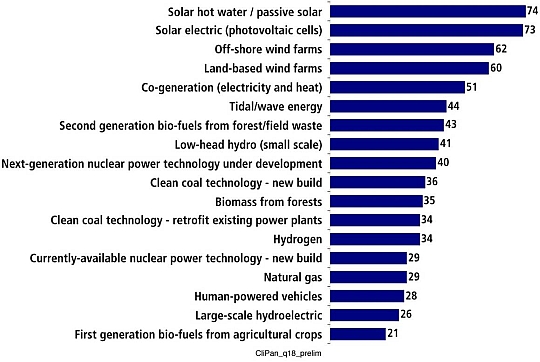GlobeScan, a self-styled “global public opinion and stakeholder research” organization based in Toronto, has just published the results of a survey of 1,000 climate “decision-makers and influencers” from across 105 countries, conducted in the two weeks leading up to the Bali Climate Conference (Nov. 22-Dec. 5, 2007).
According to the firm’s website:
Unlike public opinion polls, this survey focuses on the views of professionals in position to make or influence large decisions in their organizations and society. This focus, together with the survey’s large global sample and good balance of respondents across all geographies and sectors, makes this survey unique.
A bar chart showing the results in graphic form is found below the fold.

Among the survey’s findings:
- Decision makers rate biofuels produced from food crops like corn as having the least potential of 18 technologies for reducing carbon emissions over the next 25 years.
- Decision makers put surprisingly high emphasis on the protection of biodiversity and having sustainable development guide climate actions, while putting relatively low emphasis on cost effectiveness.
- Decision makers expect fully half of their organization’s reductions of carbon emissions over the next decade to come from energy demand management or efficiency improvements.
Another interesting result is the relatively high ranking given to tidal and wave energy. Tidal energy was first exploited decades ago, and it has been talked about ever since. Yet there are still only three tidal-barrage plants operating in the world. Perhaps the new designs, which are more like underwater wind turbines, hold more promise.
I am also curious what GlobeScan means by “human-powered vehicles.” Does that mean, like, bicycles? If so, am I the only one surprised that they would rank third from the bottom, polling only slightly ahead of large-scale hydroelectric plants and first-generation biofuels?
That first-generation biofuels from agricultural crops ranked so low is both unsurprising and surprising — unsurprising to anybody familiar with the debate on life-cycle GHG emissions associated with first-generation biofuels, but surprising because it should make one wonder how truly the polled professionals are “in [a] position to make or influence large decisions in their organizations and society.” If they were, then why do politicians keep supporting first-generation biofuels so enthusiastically?
All it takes, aparently, is a visit by a key policy maker and his or her staff to a Farm Fest. According to the San Francisco Chronicle:
[House Speaker Nancy] Pelosi’s role on the farm bill will be critical heading into next months’ negotiations with the Senate to produce a final bill. [House Agriculture Committee Chairman Colin] Peterson said he believes Pelosi was won over to farm programs during a visit to his district for an annual Farm Fest.
“She just had a great time, and her staff did, and they bonded with the farmers and she was eating pork chops on a stick and riding around in an ethanol four-wheeler,” Peterson said. “And that had a lot to do with her being as engaged and helpful as she was in finally getting the bill through.”
Eating pork chops on a stick while riding around in a flex-fuel SUV.
Hooooooo-wee! Where’s that silly little Farm Bill, Senator? Sign me up!


